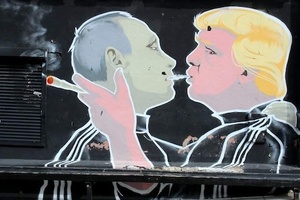Is this autocracy? edit

“Is this autocracy?” one European journalist asked me a few days ago. “Can we use the word ‘fascism’?” asked another. I’ve been answering the latter question for most of a decade now; and my answer has been yes, we can—with the caveat that I would avoid fetishizing these categories. No historical situation is ever exactly the same as any other. All of these concepts—autocracy, fascism, authoritarianism, totalitarianism, colonialism, imperialism, concentration camps, genocide—are hermeneutic devices that help us mediate between the particular and the universal. This mediation is indispensable to our ability to process reality at all—precisely in the sense that Immanuel Kant described: concepts without intuitions are empty, intuitions without concepts are blind.
At the present moment, “fascism” has felt most useful with respect to both my own country, the United States, and Russia. It would benefit, though from a modifier—“neo” for instance—to suggest the postmodern, “post-truth” version in distinction to 20th century forms. In this new, 21st century version, there is barely any longer even a veneer of a coherent narrative with any internal consistency. Now it’s “you have your facts—we have alternative facts.” “Did I say that?” Trump responds when confronted with his words from a week or a day or an hour earlier. The Kremlin’s justification for Russia’s “special military operation” in Ukraine has flowed effortlessly from defending the integrity of the Donetsk and Lugansk People’s Republics to denazifying Ukraine to preemptively attacking NATO (NATO allegedly having been preparing an attack on Russia) to restoring the lands of Peter the Great to “de-satanizing” Kyiv—the latter explanation inspiring a debate among Kremlin propagandists as to whether Zelensky was the Antichrist himself or a mere demon in the service of the Antichrist.
“Right before our eyes, a world order is being formed in which truth as a category does not exist,” the Ukrainian author Oleksandr Mykhed wrote on the third anniversary of Russia’s full-scale invasion.
A lesson from East European dissident philosophy of the 1970s and 1980s is that epistemological questions are always already ethical questions. Without a distinction between truth and falsehood, we have no basis for a distinction between good and evil. And at present there is barely even an attempt to conceal the absence of such a basis. On the contrary, there is a constant obnazhenie—“laying bare”—of the boundless corruption and naked transactionalism. This was a conscious innovation of the political technologists who created Putinism. As Vladislav Surkov explained in a 2019 essay:
“Our system, as in general everything of ours, оf course does not appear more elegant, but in return it is more honest. And although it is far from everyone for whom ‘more honest”’ is synonymous with ‘better,’ ‘more honest’ is not without its attractiveness. Our state is not divided into the deep and the superficial; it forms a whole, with all of its components and symptoms on the surface. The most brutal structures of its power scaffolding run straight along the façade, not concealed by any architectural superfluity. The bureaucracy, even when it practices deceit, does so not terribly thoroughly, as if working from the assumption that ‘everyone understands everything anyway.’[1]”
When in the summer of 2022 Russia blocked Ukrainian ships from delivering grain to Africa, Kremlin propagandist Margarita Simonyan on the occasion of the Petersburg Economic Forum announced, “All our hope is in famine.”[2]
Once upon a time, historians might have spent months, if not years, digging in archives trying to find the scrap of paper where someone admitted to having such a plan, even such a thought. Now the blackmail is declared aloud on television. I’ve seen a not dissimilar shift on my side of the Atlantic as well. I was nineteen and in California in 1991 when the Senate was deliberating whether to confirm Clarence Thomas’s nomination to the Supreme Court after Anita Hill testified that he had sexually harassed her. Listening to the Senate hearings over the radio then, I understood that Anita Hill was telling the truth. And I also understood that the men judging the testimonies were not going to believe her. There was an implicit attitude: we’re unable to believe this. I was forty-six and in eastern Ukraine in 2018 when the Senate was deliberating whether to confirm Brett Kavanaugh’s nomination to the Supreme Court after Christine Ford testified that he had sexually assaulted her. Watching the Senate hearings on the internet then, I understood that Christine Ford was telling the truth. And this time I understood that the men judging the testimonies believed her—they just did not care. And they did not even try to hide that. Now there was an implicit attitude: yes, well, and so what?
Today United States Secretary of Defense Pete Hegseth symbolizes the reign of the brazen “so what?”
This obnazhenie—a Slavic word we lack in English—is more than a curiosity. From the time when Trump first appeared as a presidential candidate, supporters were citing his “honesty” as a reason for his appeal. “Honesty” here did not refer to correspondence between what he said and empirical reality—there was obviously no such correspondence—but nor was it an empty word. “Honesty” meant that the artifice of civility had been removed. Now, if a man saw a woman walking down the street and wanted to rape her, it was permissible to express that aloud. The allure was precisely as Sigmund Freud had explained in Civilization and its Discontents: humans continually experienced desires to rape and kill one another; Eros and Thanatos were innate human drives. The necessary condition for civilization was the repression of these drives—which was why civilization would always make us unhappy. What Trump has offered from the outset is liberation from repression. This, Freud tells us, is real liberation—for which we pay the small price of the destruction of civilization.
And we are paying that price.
The Ukrainian philosopher Volodymyr Yermolenko, drawing on the Freudian Thanatos, has proposed describing Putinism and Trumpism as “thanatocracy.” Another Ukrainian philosopher, Constantin Sigov, has described Putinism as “nihilism made systemic.” In turn the Ukrainian psychoanalyst Jurko Prochasko has described Trump as “the Joker of the Apocalypse.” The description evokes the performance aspect of this nihilism. The obscene Oval Office meeting between Trump and Vance and Zelensky was a staged scene of humiliation. “You must say thank you” is what the abusive husband says to his wife, what the Stalinist inquisitor said to the victims of the show trials sentenced to death, what the members of the seventeenth century tribunal said to the women accused of witchcraft being led to the stake to be burned alive. The performance progressed to shaming Zelensky: “Why aren’t you wearing a suit?” “You’re not holding any cards.” Zelensky’s response was the perfect one—“we’re not playing cards”—which further highlighted Trump’s declared identity as the “deal-maker” who shamelessly regards all relationships as purely transactional. There is no truth and falsehood, no good and evil, only the what is advantageous or disadvantageous to himself at a given moment. And there is no attempt to conceal this.
Perhaps still more grotesque was Trump’s as if uncomprehending accusation, “You see the hatred he's got for Putin. It's very tough for me to make a deal with that kind of hatred. He's got tremendous hatred.”
If someone is bombing your cities and burying your children under rubble and taking your journalists captive, tying them to boards and torturing them with electric shocks day after day you might not have warm feelings towards that person, or even instrumentalist, let’s-make-a-deal kind of feelings—unless, of course, all those lives mean absolutely nothing to you. Trump and Putin live in a world where other people’s lives mean absolutely nothing to them.
Immediately following that Oval Office meeting Republican Senator Lindsay Graham commented, “Today, President Trump gave a masterclass on how to stand up for America.”
I tweeted back at Graham: “In fact, what happened on Friday is that President Trump gave a masterclass on moral nihilism and Lindsay Graham gave a masterclass on selling one’s soul to the devil.”
The following day Anna Nemzer, the Russian oppositionist journalist in exile, posted on Facebook: “Three years ago, in the morning of February 24th, one formulation was spinning in my head: I no longer have a country. And not only because I have not been to Russia since that day—because what I considered a country, the political entity of ‘country,’ ceased to exist. For what remained one could think up various designations ranging from a terrorist group to a laboratory where experiments in dehumanization are performed. Yesterday before my eyes an entirely different country ceased to be a country as a political entity. What to call it is as of yet unclear, but nuclear zoologists will concern themselves with the terminology, as they will with the actual study of this substance.[3]”
In some sense it is this obnazhenie that has disempowered the opposition: we don’t know what to do with the obviousness of the lies, the moral nihilism, the obscenity, the cruelty for the sake of cruelty, the destruction for the sake of destruction. Last March I was in Kyiv, and just on one morning, between 3 and 6 am, Russia fired 31 missiles at the capital. This amounted to $390 million dollars’ worth of missiles. A country millions of whose citizens are too impoverished to have indoor plumbing spent $390 million dollars in one morning purely to kill and destroy for no reason.
For Hannah Arendt, grasping the essence of Nazi Germany meant understanding the creation of “factories to produce corpses.” Today grasping the essence of Putinist Russia means understanding the creation of factories to produce fictions. Little, after all, symbolizes postmodern neofascism as well as the Petersburg troll factory that spun both the story of the Maidan as a CIA-sponsored, Ukrainian Nazi conspiracy and the story of Pizzagate—that is, the story that Hillary Clinton was kidnapping children and holding them captive in the basement of a Washington, DC pizzeria to exploit for child pornography. At a corporate office tech-savvy IT employees pass the hours by digitally throwing spaghetti against the wall to see what sticks, no one even pretending to believe anything. Everyone knows it’s all a game. Yet the corpses pile up pitilessly.
We try to expose what’s hidden, but that is perhaps a 20th century method better suited for 20th century fascisms. Today much more threatening than whatever remains concealed is what has been normalized. European journalists keep asking me, disbelievingly, variations of the question: but can this really be happening in America? On the one hand, they think of America as a barbarian country devoid of Kultur—on the other hand, they cannot let go of the myth of the land of the free and the home of the brave. It's as if the kids wrenched away from parents on the Mexican border and locked in cages and the president's inciting a violent insurrection in the capital and encouraging a mob to hang his vice-president and the Venezuelans baselessly accused of terrorism and deported into an El Salvadorian prison and the students disappeared off the streets by guys in balaclavas and the threats of invading Canada and Greenland and the grotesque fawning over Putin have failed to make a real impression. Speaking to Europeans, I often feel as if I were playing the role of psychoanalyst trying to help them break out of their Freudian denial of what is in front of their eyes.
“The task of Europe in these times of emergency,” the Ukrainian art curator Vasyl Cherepanyn wrote, “is primarily to unlearn to unsee, in order to learn to see.” We need to look at the nihilism with eyes wide open. To Europeans I would say this: this is it, the end of the affair. The United States is falling into an abyss, with some joyful coaxing from the mass murderer in the Kremlin. Ukraine is your chance. Please do not let yourselves be taken down with us.
Did you enjoy this article? close




[1] “Наша система, как и вообще наше все, смотрится, конечно, не изящнее, зато честнее. И хотя далеко не для всех слово «честнее» является синонимом слова «лучше», оно не лишено притягательности. Государство у нас не делится на глубинное и внешнее, оно строится целиком, всеми своими частями и проявлениями наружу. Самые брутальные конструкции его силового каркаса идут прямо по фасаду, не прикрытые какими-либо архитектурными излишествами. Бюрократия, даже когда хитрит, делает это не слишком тщательно, как бы исходя из того, что «все равно все всё понимают».”
[2] «Вся надежда на голод»
[3] Три года назад, утром 24-го февраля, у меня в голове вертелась одна формулировка: у меня нет больше страны. И не только потому, что я с этого дня не была в России — потому что то, что я считала страной, политической единицей «страна», прекратило свое существование — тому, что осталось, можно было придумывать разные обозначения в диапазоне от террористической группировки до лаборатории, где проводятся опыты расчеловечивания. Вчера на моих глазах совершенно другая страна перестала быть страной как политической единицей. Как это называть, пока непонятно, но терминологией, как и собственно изучением этой субстанции, будут заниматься зоологи-ядерщики.

